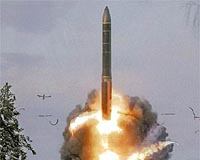| . |  |
. |
Washington (AFP) June 8, 2009 Indonesia on Monday offered a boost to President Barack Obama's vision of a nuclear-free world, pledging to ratify a treaty banning nuclear tests if the US Senate does. Obama said in April said he would ask the Senate to ratify the Comprehensive Test Ban Treaty (CTBT), part of his ambitious goal of eliminating nuclear weapons unveiled in a speech in Prague. Indonesia is one of nine countries including the United States that need to ratify the treaty, which would ban all nuclear explosions everywhere for any purpose, to come into force. "We share his vision of a world in which nuclear weapons have been eradicated," Indonesian Foreign Minister Hassan Wirajuda said on a visit to Washington. "We trust that he will succeed in getting the CTBT ratified -- and we promise that when that happens, Indonesia will immediately follow suit," he said at the Carnegie Endowment for International Peace. Wirajuda spoke before a meeting with US Secretary of State Hillary Clinton, who visited Jakarta in February in a sign of the new US administration's interest in the world's largest Muslim-majority nation. While Obama's anti-nuclear initiative was mostly warmly received around the world, one holdout from the treaty -- North Korea -- brazenly defied it by testing an atomic bomb last month. The other nations that have not ratified the treaty are India and Pakistan, which both refuse even to sign it, along with China, Egypt, Iran and Israel. Wirajuda said Indonesia -- which operates nuclear reactors but does not have nuclear weapons -- held back ratification because it was "dismayed" that other nations were moving ahead with the ultra-destructive weapons. "The threat of a nuclear holocaust has (been growing) simply because for a long time it was forgotten -- until President Obama came on the scene," Wirajuda said. Wirajuda said Indonesia was ready to help the United States negotiate with North Korea and Iran, which is suspected of seeking nuclear weapons. Indonesia maintains friendly relations with both Tehran and Pyongyang. Obama spent part of his childhood in Indonesia, an experience he credits with giving him a greater understanding of the Islamic world. In turn, Obama is wildly popular in much of Indonesia, in contrast to predecessor George W. Bush. Wirajuda lavished praise on Obama's speech last week in Cairo, in which the US leader called for a "new beginning" with the Muslim world after years of mutual suspicion. "The echoes of a great speech -- one of the greatest speeches I have ever heard from a world leader -- are still ringing in my ears and in the ears of all humankind," Wirajuda said. He said that Indonesia and the United States can work together to advance common global goals including religious tolerance and democracy. The US-Indonesia Society, which promotes ties between the two nations, released recommendations for building a "comprehensive partnership" between the world's second and third largest democracies. It called for an end to a ban on US military training of Indonesian units accused of human rights violations before the transition to democracy, saying that Washington should instead only blacklist individuals over wrongdoing.
Share This Article With Planet Earth
Related Links Learn about nuclear weapons doctrine and defense at SpaceWar.com Learn about missile defense at SpaceWar.com All about missiles at SpaceWar.com Learn about the Superpowers of the 21st Century at SpaceWar.com
 Russia: no nuclear cuts if US unclear on missile defence
Russia: no nuclear cuts if US unclear on missile defenceMoscow (AFP) June 5, 2009 Russia's military on Friday warned the US that it would not reduce its nuclear arsenal until Washington made clear whether or not it would go ahead with a controversial missile shield in Central Europe. The comments by the country's top general exposed a potential hitch as the two sides hold talks on replacing a key Cold War-era nuclear arms reduction treaty by the end of the year. ... read more |
|
| The content herein, unless otherwise known to be public domain, are Copyright 1995-2009 - SpaceDaily. AFP and UPI Wire Stories are copyright Agence France-Presse and United Press International. ESA Portal Reports are copyright European Space Agency. All NASA sourced material is public domain. Additional copyrights may apply in whole or part to other bona fide parties. Advertising does not imply endorsement,agreement or approval of any opinions, statements or information provided by SpaceDaily on any Web page published or hosted by SpaceDaily. Privacy Statement |